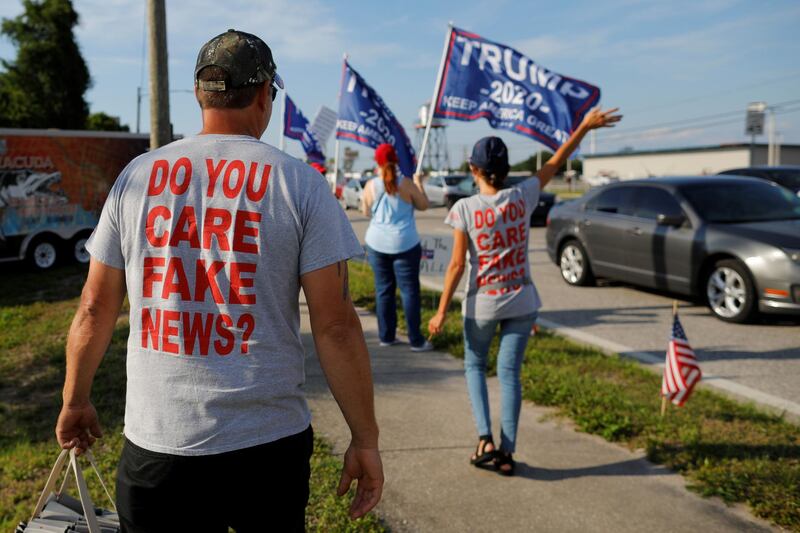Last Tuesday, US President Donald Trump launched his campaign for re-election in November 2020. Given that Mr Trump's candidacy was largely built on his stint as the star of The Apprentice, many commentators could not resist comparing his angry, grievance-emphasising launch rally in Florida with his reality TV appearances.
His rundown of greatest hits included attacks on familiar enemies, such as "the fake news media", "un-American elites", "radical and unhinged" Democrats, and, of course, Hillary Clinton – his followers dutifully chanting "lock her up" at every mention of her name, despite her near invisibility of late.
The relentless nostalgia of the rally strongly suggested that the Trump presidency has been a lot less exciting than his 2016 campaign. He seems to be mainly appealing for re-election on the grounds that he won against the odds last time.
Mr Trump is by far the most unpopular president in modern US history, having never surpassed 50 per cent approval in any representative group of polls over a sustained period. His party also took a serious drubbing in the midterm elections.
Yet he could well be re-elected. He won last time, to the surprise of almost everyone, apparently even himself. He also has several new advantages, including a strong economy, relative peace and the considerable power of incumbency.
He has also completely conquered the Republican Party, which now resembles a personality cult in which criticism of him is intolerable heresy.
However, if Democrats can unify and energise their own base, there is also a good chance he could be defeated.
Many of the independents and swing voters who decided, at the last minute, to vote for Mr Trump rather than Mrs Clinton in 2016 may be more tired of his now very familiar routine than his diehard fans.
What is most remarkable about the Trump presidency, and has yet to be tested at the polls, is the accelerating process of deinstitutionalisation he has unleashed since his inauguration.
At every step, Mr Trump has undermined, discredited, disempowered and even dissolved core American democratic, political and civic institutions in a manner that reflects deeply authoritarian yearnings.
This has intensified significantly in recent months.
He began with a war against the "fake news" media, bluntly telling reporters that he was intent on discrediting the press, in case they reported anything embarrassing about him.
As soon as the investigation of Russian interference in the last elections by the FBI and the Justice Department was revealed, he began to decry the FBI as "treasonous" and "crooked."
With Attorney General William Barr now leading the way, Mr Trump’s administration has begun investigating the investigations, and the conduct of his own staff and associates, suggesting it was all a treasonous plot or "coup” by “crooked cops.”
His supporters in Congress are even vowing to send FBI officials to prison for simply doing their jobs.
Mr Barr has repeatedly referred to what seem to be well-founded investigations into apparent foreign espionage as "spying”, suggesting nefarious abuses of power without any evidence.
The atmosphere of vengeance, intimidation and coercion against federal law enforcement has become intense.
Mr Trump has also repeatedly attacked the courts, the military, the intelligence services, his own bureaucracy, all Democrats, any Republicans who don't agree with him, and anyone else who might get in his way.
Now that Democrats have taken control of congressional committees and pursued their constitutional oversight role by investigating administration conduct, Mr Trump is also trying to strip Congress of its essential powers.
He has instructed all his current and former aides to refuse to co-operate with congressional investigations, or to answer any questions about their activities in the administration, or even in the transition team before he was inaugurated.
Mr Trump’s lawyers called their blanket claim of executive privilege on everything his staff has ever done in his service "absolute immunity". It is an original and chilling perspective that would eliminate congressional oversight almost completely.
Worse, his attorneys have been insisting in court that Congress has no authority to investigate lawbreaking under any circumstances, including by the president or the administration, except perhaps in the context of an impeachment inquiry.
It's an absurd idea, but it has been made at least twice by administration lawyers in recent court cases, and probably will be again.
If sustained, that would mean Congress would have essentially no investigative authority, and that the entire executive branch of the government could only be investigated by itself.
The president and administration would, in effect, therefore be above the law and immune from any investigation of lawbreaking unless it initiates it itself. And no one at all could investigate lawbreaking by a president.
This ridiculous claim is very unlikely to prevail. But, in its own quiet way, it is probably the most authoritarian attack on American constitutional democracy by any administration in more than 100 years.
Incumbency cuts two ways for Mr Trump. He can and does exploit the gravitas of the office, but everyone now knows exactly who and what they are voting for and against.
Democratic campaign slogans may well suggest that it is “Time to change the channel”.
Hussein Ibish is a senior resident scholar at the Arab Gulf States Institute in Washington





